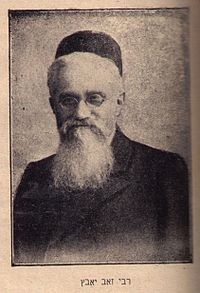Ze'ev Yavetz: Difference between revisions
+data |
+data |
||
| Line 1: | Line 1: | ||
[[File:Zeev yaabetz.jpg|thumb|200px|right]] |
[[File:Zeev yaabetz.jpg|thumb|200px|right]] |
||
'''Ze'ev Yavetz''' (also '''Javetz''') ({{lang-he|זאב יעבץ}}, 26 September 1847 – 24 January 1924) was a |
'''Ze'ev Yavetz''' (also '''Javetz''') ({{lang-he|זאב יעבץ}}, 26 September 1847 – 24 January 1924) was a Polish-Jewish historian, teacher and [[Hebrew]] linguist. |
||
==Biography== |
==Biography== |
||
Ze'ev (Wolf) Yavetz was born in [[Kolno]] in the [[Russian Empire]] (today in [[Poland]]). He published his first historical article in HaShahar, a Hebrew monthly published by [[Peretz Smolenskin]].<ref>[https://books.google.co.il/books?id=x1bNkmjiFmMC&pg=PA158&lpg=PA158&dq=ze%27ev+yavetz&source=bl&ots=pg0Klqeou4&sig=JdrW1CisfsZm7auOF-A72mDaABY&hl=en&sa=X&ved=0ahUKEwi00sevrtTXAhXNIlAKHQKeD8A4ChDoAQgqMAI#v=onepage&q=ze'ev%20yavetz&f=true Prophets of the Past: Interpreters of Jewish History, Michael Brenner]</ref> |
|||
Ze'ev (Wolf) Yavetz was born in [[Kolno]] in the [[Russian Empire]] (today in [[Poland]]). In 1887, at the age of 40, he [[aliyah|immigrated]] to [[Ottoman Empire|Ottoman]]-controlled Palestine. He initially worked in a vineyard in the Yehud [[moshava]], before being recruited by [[Edmond James de Rothschild]] to be headteacher at a school in [[Zikhron Ya'akov]].<ref name=HA/> |
|||
On [[Tu Bishvat]] that year he took his students to plant trees in Zikhron Ya'akov.<ref name=HA>[http://www.haaretz.com/jewish-world/jewish-world-features/with-tu-bishvat-near-a-tree-grows-in-zichron-yaakov.premium-1.496141 With Tu Bishvat near, a tree grows in Zichron Yaakov] Haaretz, 25 January 2013</ref> This custom was adopted in 1908 by the Jewish Teachers Union and later by the [[Jewish National Fund]]. |
In 1887, at the age of 40, he [[aliyah|immigrated]] to [[Ottoman Empire|Ottoman]]-controlled Palestine. He initially worked in a vineyard in the Yehud [[moshava]], before being recruited by [[Edmond James de Rothschild]] to be headmaster of a school in [[Zikhron Ya'akov]].<ref name=HA/>On [[Tu Bishvat]] that year he took his students to plant trees in Zikhron Ya'akov.<ref name=HA>[http://www.haaretz.com/jewish-world/jewish-world-features/with-tu-bishvat-near-a-tree-grows-in-zichron-yaakov.premium-1.496141 With Tu Bishvat near, a tree grows in Zichron Yaakov] Haaretz, 25 January 2013</ref> This custom was adopted in 1908 by the Jewish Teachers Union and later by the [[Jewish National Fund]]. |
||
Yavetz was |
Yavetz was a member of the [[Academy of the Hebrew Language|Hebrew Language Committee]], and coined several modern Hebrew words, including ''tarbut'' (culture) and ''kvish'' (road).<ref name=HA/> |
||
After falling out with Rothschild he moved to [[Vilnius|Vilna]]. In 1902, he helped to found the [[Mizrachi (religious Zionism)|Mizrachi]] movement and became the editor of its periodical "HaMizrachi." In 1903, at a reception for [[Theodor Herzl]], he presented the Zionist leader with a small [[Torah]] scroll in a carved holder as a gift of honor from the Vilna community.<ref>''Theodore Herzl: A Biography'', Alex Bein, Jewish Publication Society, 1956, p.451 </ref> |
|||
Yavetz used the Bible in a new thematic and stylistic manner with the object of reviving ancient ways of life. He has been called a "proto-Orientalist."<ref>[https://books.google.co.il/books?id=I3IbSoq07XMC&pg=PA26&lpg=PA26&dq=zeev+yavetz+yehud&source=bl&ots=ViDHcusCUI&sig=jQ9lBQE8CBVPCqyAxEkFtOEzo94&hl=en&sa=X&ved=0ahUKEwiEzf39rNTXAhWQEewKHVJ7CYEQ6AEIOjAE#v=onepage&q=zeev%20yavetz%20yehud&f=true Orientalism and the Hebrew Imagination, Yaron Peleg]</ref> |
Yavetz used the Bible in a new thematic and stylistic manner with the object of reviving ancient ways of life. He has been called a "proto-Orientalist."<ref>[https://books.google.co.il/books?id=I3IbSoq07XMC&pg=PA26&lpg=PA26&dq=zeev+yavetz+yehud&source=bl&ots=ViDHcusCUI&sig=jQ9lBQE8CBVPCqyAxEkFtOEzo94&hl=en&sa=X&ved=0ahUKEwiEzf39rNTXAhWQEewKHVJ7CYEQ6AEIOjAE#v=onepage&q=zeev%20yavetz%20yehud&f=true Orientalism and the Hebrew Imagination, Yaron Peleg]</ref> |
||
In his latter years he moved to [[England]], where he completed his 14-volume history of the Jews ''Toldot Yisrael''.<ref name=HA/> He died in [[London]] in 1924. |
In his latter years he moved to [[England]], where he completed his 14-volume history of the Jews ''Toldot Yisrael''.<ref name=HA/> He died in [[London]] in 1924. |
||
A [[moshav]] in [[Israel]], [[Kfar Yavetz]], is named after him. |
|||
==References== |
==References== |
||
Revision as of 09:26, 23 November 2017

Ze'ev Yavetz (also Javetz) (Hebrew: זאב יעבץ, 26 September 1847 – 24 January 1924) was a Polish-Jewish historian, teacher and Hebrew linguist.
Biography
Ze'ev (Wolf) Yavetz was born in Kolno in the Russian Empire (today in Poland). He published his first historical article in HaShahar, a Hebrew monthly published by Peretz Smolenskin.[1]
In 1887, at the age of 40, he immigrated to Ottoman-controlled Palestine. He initially worked in a vineyard in the Yehud moshava, before being recruited by Edmond James de Rothschild to be headmaster of a school in Zikhron Ya'akov.[2]On Tu Bishvat that year he took his students to plant trees in Zikhron Ya'akov.[2] This custom was adopted in 1908 by the Jewish Teachers Union and later by the Jewish National Fund.
Yavetz was a member of the Hebrew Language Committee, and coined several modern Hebrew words, including tarbut (culture) and kvish (road).[2]
After falling out with Rothschild he moved to Vilna. In 1902, he helped to found the Mizrachi movement and became the editor of its periodical "HaMizrachi." In 1903, at a reception for Theodor Herzl, he presented the Zionist leader with a small Torah scroll in a carved holder as a gift of honor from the Vilna community.[3]
Yavetz used the Bible in a new thematic and stylistic manner with the object of reviving ancient ways of life. He has been called a "proto-Orientalist."[4]
In his latter years he moved to England, where he completed his 14-volume history of the Jews Toldot Yisrael.[2] He died in London in 1924.
A moshav in Israel, Kfar Yavetz, is named after him.
References
- ^ Prophets of the Past: Interpreters of Jewish History, Michael Brenner
- ^ a b c d With Tu Bishvat near, a tree grows in Zichron Yaakov Haaretz, 25 January 2013
- ^ Theodore Herzl: A Biography, Alex Bein, Jewish Publication Society, 1956, p.451
- ^ Orientalism and the Hebrew Imagination, Yaron Peleg
